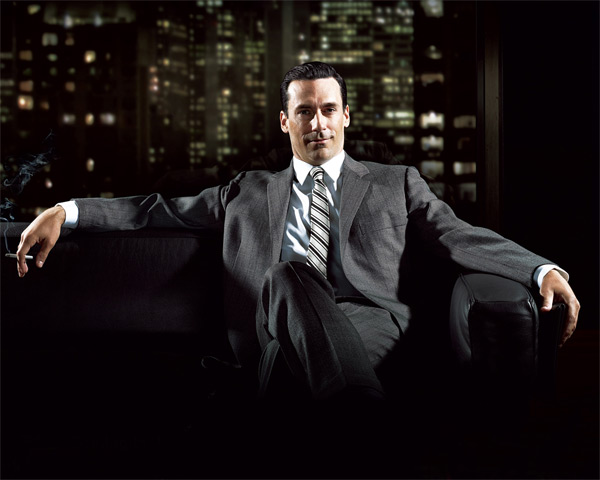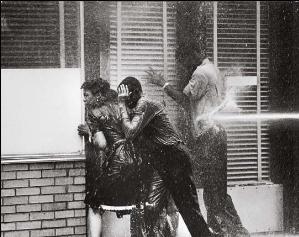
I like Mad Men. It's a good show, well-written and -acted. All of that. I'm not turning myself into a Mad Men avatar like other fans, but I get the allure. (Besides, there's no maid's uniform.) The world of Mad Men is sleek, shiny, colorful; it totally messes up my "the only colors available in the olden days were black and white" argument. I probably think this way because I am, like, totally generation neon. As good as it is, MM is also very white--whiter than, say, a drinking game at your local frat house. But I value MM for what it is, which I suppose could be described as privileged white people being their privileged white selves.
The show's pretty blatant about the smoking, the booze, the misogyny, the racism and sexism, and other things we like to pretend only existed in times like the 60s, especially since we're all post-everything now. I even appreciate the way black people are portrayed, which is to say they appear sparingly and as they need to be in this world: as maids, as elevator men, as waiters, as silent(ly?) as possible. That's where and how I expect to see black people, if at all, on a show like MM. I don't anticipate seeing black people, say, on Cheers or... Animal Planet, because voluntarily kicking it with alligators and mambas seems like some white stuff to me. So I definitely don't imagine the Negroes of MM chatting it up by the new Xerox machine--unless they're cleaning it. And if they're cleaning it, they need to hush up while they do it. After all, white folks is trying to work.
Due to my position on blacks and the show, I had that "Really?" face as I read Latoya Peterson's blog about Mad Men and race. In it, Peterson argues that people of color, particularly black people, are rarely seen on screen, and when they are their appearances are brief, sporadic, and often nonverbal. For Peterson, this suggests that (the creators of) MM don't want to engage with race, which is totally weird especially since it's the 60s, and there are colored drinking fountain signs, like, everywhere (below the Mason-Dixon). She writes, "Although [lead character, Don] Draper has a gift for engaging and seeing through marginalized types—the unwed mother, the Jewish heiress, the closeted gay man—in the case of the black characters, the relationship never goes beyond shallow conversation."
Um, yeah. Maybe I've read Invisible Man a few too many times ("I am invisible, understand, simply because people refuse to see me." [That's on page three, and I didn't even have to look.]), but it seems to me that that's exactly how black people are supposed to be on a show like this. The characters Peterson lists are all necessary components to Draper's life; he works with them. He doesn't volunteer to hang out with baby mamas. He has to hang out with baby mamas. And further, these characters, though marginalized, are citizens, to some degree, of the province of whiteness.
This is just an educated guess, but race is an abstraction to white people, especially privileged ones who only really only need to interact with them when they need a shoe shine, and I think the show reflects that. But I get it. When I think about the 1960s, I think of Negroes m
 arching in uncomfortable clothes during a hot ass southern summer, and water hoses that might have been a welcome way to cool off had it not been for the force and the German shepherd trying to bite that ass. Maybe I think about a hippie or two or the obnoxious-ass Beats. But it's mostly black kids trying to go to school. Sometimes these memories are interrupted by Tom Hanks with a buzz cut, but I quickly remember that that was just some movie. The images are so ingrained that I forget that there were people, very privileged people, who were incredibly distanced from this movement starring our nation's minions. Blackness is something MM characters don't engage in because they don't have to. And that for me is not about not wanting to discuss race, but rather a really powerful, subtle commentary on race. I think what Peterson calls "shallow conversation" is in actuality something much more than that. The presence (and absence) of blacks is subtle, but intentional, signaling the insulation whiteness provides from aspects of American life that take race and racial difference as a matter of existence. Not every model comes with a veil.
arching in uncomfortable clothes during a hot ass southern summer, and water hoses that might have been a welcome way to cool off had it not been for the force and the German shepherd trying to bite that ass. Maybe I think about a hippie or two or the obnoxious-ass Beats. But it's mostly black kids trying to go to school. Sometimes these memories are interrupted by Tom Hanks with a buzz cut, but I quickly remember that that was just some movie. The images are so ingrained that I forget that there were people, very privileged people, who were incredibly distanced from this movement starring our nation's minions. Blackness is something MM characters don't engage in because they don't have to. And that for me is not about not wanting to discuss race, but rather a really powerful, subtle commentary on race. I think what Peterson calls "shallow conversation" is in actuality something much more than that. The presence (and absence) of blacks is subtle, but intentional, signaling the insulation whiteness provides from aspects of American life that take race and racial difference as a matter of existence. Not every model comes with a veil.I think those popular images of the 60s stage a desire in us to see everyone who lived during the period being profoundly affected by what was happening in the world. Perhaps it establishes an expectation that the stories we write that take place during that epoch deal with the fight for civil rights on some level. And maybe said images also create the assumption that a discussion on race and the 60s must happen through the conduit of black people and the civil rights struggle. MM shows us--with intention--that there were plenty of people who could afford not to care deeply about any of it, that white privilege is predicated upon being able to choose apathy with little to no ramifications, and it is exactly because black people are only seen on the margins that we can understand this. How easy could it have been to simply have a white elevator operator or waiter? When I watch MM, what I see, especially in the second season, is not simply how whiteness can protect one from the harsh realities of race, but also the pillars of that same (fantasy of) whiteness seemingly start to crumble--which perhaps speaks to both now and then--as if someone tied a sleeping Samson to them and he woke up--irritable and in need of a stretch. The race commentary on MM can be understood as the delineation of extreme obliviousness to (colored) folks on the margins, and the disrobing of some of the fantasies of whiteness. And because black characters especially have been employed in deliberately subtle and provocative ways, I think the story might arc into an interesting commentary on race--marching black folks and all.
One of scenes in Season 2 that stuck out for me was the moment in "The Jet Set" episode where Don has ventured to Palm Springs, California, with a young woman he meets at a hotel during a business trip. After sex, the woman opens a Faulkner novel, The Sound and the Fury. Don asks her what she thinks about the book, and she admits not being overly enthusiastic it. This scene parallels the previous episode where Paul Kinsey, the bearded wannabe playwright, has gone to Mississippi with his Negro girlfriend to register voters. (He gets dumped during, or some time after, the trip.) But there's even more significance. This is Faulkner's novel about the slow decay of a once prominent white southern family. In TSATF, part of what's happening is the crumbling of whiteness, its facade, and the myth of the South. Similarly, the patriarchal white world established in the first season of MM is ripping at the seams by season 2. Reality has waged war on the image of perfection, and there's not enough alcohol to go around. Folks are clinging to their race and gender privilege as if it is the last life preserver on the Titanic. And when those cards are declined, the characters TOTALLY FREAK OUT. It's great tv.
What's more, Faulkner's novel ends with an Appendix, or what is sometimes referred to as the fifth chapter of the book. Faulkner added it in 1945 because, frankly, what literate person knows what the hell is going on without that thing? It provides a family tree, brief descriptions of the characters, a time line, etc. Draper rips out the last page of the book because he needs to write down an address. What's on the last page? A description of Dilsey, the black servant who has taken care of the Compson family for years. The line? They endured. Yep. That's it. Faulkner offers rather generous explanations of other characters and events, but those are the two words he provides for Dilsey. And that's the page Draper, who has constructed his own (rapidly changing) world of privilege, presumably rips out. Right there in the California desert, a place where one can escape one's racial past (dissertation plug). He never reads it, and neither will the owner of the book. It's been rendered unnecessary, unimportant--and this act of erasure of Dilsey and who and what she personifies says a lot about Draper and his world, and I don't think the symbol was a fluke.
Peterson ends by averring that if MM continues to keep race at a distance in season three, which takes place during the pivotal year of 1963, then the writers of MM are cowards. But just as one of the characters called black kids trying to integrate "troublemakers," I think the MM response to the March on Washington, for example, may be just as quick, but incredibly telling. One need not have a black family move next door to properly comment on race. Sometimes the very fact that the black family doesn't live next door offers a more interesting, nuanced conversation.
Though it's hard to determine writer's intent, I think the evidence on the television suggests that the creators of MM are thinking about race much more deeply and deliberately than Peterson claims, not that they're scared and hence distance the subject. I know I don't think about the war, or a whole bunch of other stuff that historians will deem significant, everyday. If 40 years from now someone wanted to create a show about someone like me, it would be thoroughly inaccurate for them to write narrative where I was directly affected by it. It would be more precise, and perhaps more telling, if they imagined it the way it happened.
Whatever the case, I sincerely hope the third season of MM is as interesting as the first two. Third seasons can be tricky, and horrifically disappointing to viewers. Trust me. I know. I used to watch Heroes. And Weeds.
No comments:
Post a Comment